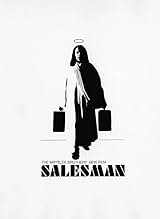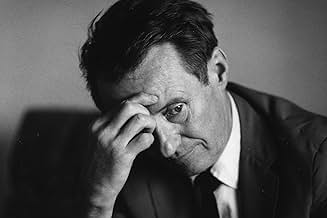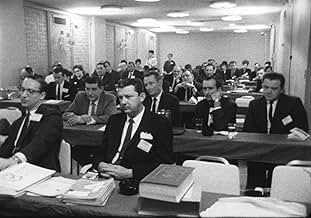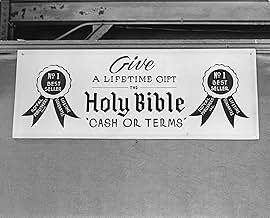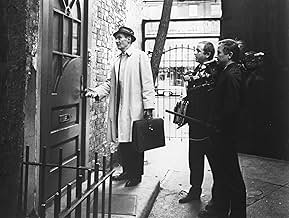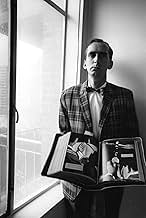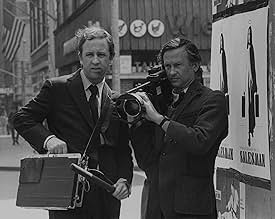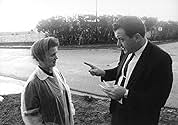IMDb RATING
7.6/10
6.1K
YOUR RATING
Four dogged door-to-door Bible salesmen travel from Boston to Florida on a seemingly futile quest to sell luxury editions of the Good Book to working-class Catholics.Four dogged door-to-door Bible salesmen travel from Boston to Florida on a seemingly futile quest to sell luxury editions of the Good Book to working-class Catholics.Four dogged door-to-door Bible salesmen travel from Boston to Florida on a seemingly futile quest to sell luxury editions of the Good Book to working-class Catholics.
- Awards
- 4 wins total
7.66K
1
2
3
4
5
6
7
8
9
10
Featured reviews
Quiet desperation more relative to many occupations than we'd care to admit.
'Salesman" is a stark reminder of the evolution of the modern documentary. As a viewer I did not feel manipulated by the editing or the filmmaker's ego or perspective. The film is a historical recording of an occupation from a by gone era that promised all the perks of the American Dream while leaving many that chose it for their career living lives of quiet desperation, poor and void of any significant contribution to society.
One of the thoughts this film left me with was how many occupations in twenty-first century America are sales dependent. Selling oneself, an idea, candidate, lifestyle, fill in the blank for an alternative to "bible." Pounding the proverbial pavement to pay the mortgage with little regard to the negative impact ones profession may have on society or nameless, faceless individuals. In today's world fortunes are made as life coaches, motivational speakers, politics, infomercials, winning American Idol, all variations of selling something to a consumer society that can ill afford the debt.
"Salesman" is a timeless film and a brilliant reminder of the origins of the documentary.
One of the thoughts this film left me with was how many occupations in twenty-first century America are sales dependent. Selling oneself, an idea, candidate, lifestyle, fill in the blank for an alternative to "bible." Pounding the proverbial pavement to pay the mortgage with little regard to the negative impact ones profession may have on society or nameless, faceless individuals. In today's world fortunes are made as life coaches, motivational speakers, politics, infomercials, winning American Idol, all variations of selling something to a consumer society that can ill afford the debt.
"Salesman" is a timeless film and a brilliant reminder of the origins of the documentary.
Essential
"Salesman" isn't quite the Maysles Bros.' (and Charlotte Zwerin's) crowning achievement, although it comes close. I personally feel that "Gimme Shelter" is their best film, but that might have something to do with it being a more enjoyable, if still harrowing film. "Salesman" is an uncomfortable examination of human emotions, and provokes a strong reaction of guilt and sympathy. Some may insist that a documentary has to be somewhat relevant to have any real value, but "Salesman", a film on the lives of door-to-door salesmen, the product of a mostly by-gone era, is pure contradiction of this claim.
A landmark 'cinema verite' film, "Salesman" does not feature any sort of narration or writing, allowing the viewer to take the images presented in the film and interpret them as they wish. There are statements that the Maysles Bros. are probably trying to make with this film, statements about suburbia, statements about the ties between business and organized religion, and more, but the beauty of the film is that it is up to you if you see this in the film or not, because really it is simply a document of an average day for a salesman at the time.
"Salesman" is funny in parts, but taken as a whole it is one of the saddest films you will ever see, a document of the quiet desperation of this lifestyle. The directors of the film make powerful statements, but do so subtly, almost unobtrusively, allowing the viewer to fully engage themselves in the almost routine feel of the film. It is a crime that, despite its strong reputation, relatively few people have seen this essential film from possibly the very best documentary filmmakers there have ever been.
10/10
A landmark 'cinema verite' film, "Salesman" does not feature any sort of narration or writing, allowing the viewer to take the images presented in the film and interpret them as they wish. There are statements that the Maysles Bros. are probably trying to make with this film, statements about suburbia, statements about the ties between business and organized religion, and more, but the beauty of the film is that it is up to you if you see this in the film or not, because really it is simply a document of an average day for a salesman at the time.
"Salesman" is funny in parts, but taken as a whole it is one of the saddest films you will ever see, a document of the quiet desperation of this lifestyle. The directors of the film make powerful statements, but do so subtly, almost unobtrusively, allowing the viewer to fully engage themselves in the almost routine feel of the film. It is a crime that, despite its strong reputation, relatively few people have seen this essential film from possibly the very best documentary filmmakers there have ever been.
10/10
The Real Life of the Door to Door Salesman
"Salesman" documents the activities of Bible salesmen as they go on the road to sell their wares to "leads" garnered from Catholic churches. It's a tough life, especially when many prospects cannot afford the cost of these illustrated Bibles.
It is difficult not to compare this film to Mamet's "Glengarry Glen Ross". It details the hardships and humiliations of men who earn their egos through sales. Anyone who has ever sold a product door to door can relate to this film.
The transparent sales techniques. The smug sales aphorisms. The roller-coaster ride from day to day. It is all there.
It is easy to draw conclusions or morals from this documentary. The most obvious refers to the soul-sucking depression that comes from spending your life doing something you do not enjoy or believe in.
As a time capsule of life in the late 60s, the film is enjoyable. Seeing everyone smoking cigarettes nonstop, for example, is a reminder of how things have changed.
It is difficult not to compare this film to Mamet's "Glengarry Glen Ross". It details the hardships and humiliations of men who earn their egos through sales. Anyone who has ever sold a product door to door can relate to this film.
The transparent sales techniques. The smug sales aphorisms. The roller-coaster ride from day to day. It is all there.
It is easy to draw conclusions or morals from this documentary. The most obvious refers to the soul-sucking depression that comes from spending your life doing something you do not enjoy or believe in.
As a time capsule of life in the late 60s, the film is enjoyable. Seeing everyone smoking cigarettes nonstop, for example, is a reminder of how things have changed.
Could have been more then but the cold look at the sales business, the sellers and the potential buyers is well done and makes for engaging if rather downbeat entertainment
Paul Brennan is "The Badger". Charles McDevitt is "The Gipper". James Baker is "The Rabbit" and Raymond Martos is "The Bull". However this is not yet another British gangster film from Guy Ritchie but rather a fly-on-the-wall documentary following these four door-to-door bible salesman as they go about their trade and shoot the breeze with one another. Selling for as much as $40 per ornate book, the target audience are mostly poor catholic families who are given a hard sell before being offered a range of payment methods. In the middle of a sales slum, we follow Paul Brennan as he tries to break his losing streak.
Probably the worst job I have done wasn't that bad but was when I was a cleaner 7 mornings a week while also going through university. It felt worse because I also worked weekend evenings in a bar. However I would happily do either of those again if the only other option open to me was telephone or door-to-door sales because to me it is a soul-destroying job. I know some people can excel at it but others scrape by on their commissions, trying to force products onto others that they wouldn't buy themselves. This documentary confirms my thoughts on the job as we follow Paul Brennan on sales calls, conferences and sales meetings. Those familiar with Glengary Glenross will know where they are already and personally I kept seeing Brennan as the Gill character from the Simpsons, frantically just trying to get by. The film doesn't provide much more insight than that because it is very much a fly-on-the-wall affair that lets the characters speak for themselves.
By doing this it lays bare the approach of the sales game. It is depressing for several reasons and it made me feel sympathy for Brennan as often as I felt repulsed by him. He doesn't care about those he is selling to and he lies, applies pressure and guilts his marks into buying something they don't need and often don't actually want. But it is easy to feel for him because he is doing a job. I have never had someone coming door-to-door astonish me with a service or product that I suddenly wanted, especially nowadays, if you want it and can afford it, you probably already have it, but the sales staff still need to sell and Brennan's way is the most basic approach. The Maysles brothers wisely stay out of the way and I was quite amazed at how unobtrusive their camera was even when the sales were in relatively confined rooms.
Overall this is a rather depressing film that could have had more in the way of insight but does well to stand back and just observe. Modern documentaries often lose that so in a way it was refreshing not to have talking heads throughout the footage. Could have been more then but the cold look at the sales business, the sellers and the potential buyers is well done and makes for engaging if rather downbeat entertainment.
Probably the worst job I have done wasn't that bad but was when I was a cleaner 7 mornings a week while also going through university. It felt worse because I also worked weekend evenings in a bar. However I would happily do either of those again if the only other option open to me was telephone or door-to-door sales because to me it is a soul-destroying job. I know some people can excel at it but others scrape by on their commissions, trying to force products onto others that they wouldn't buy themselves. This documentary confirms my thoughts on the job as we follow Paul Brennan on sales calls, conferences and sales meetings. Those familiar with Glengary Glenross will know where they are already and personally I kept seeing Brennan as the Gill character from the Simpsons, frantically just trying to get by. The film doesn't provide much more insight than that because it is very much a fly-on-the-wall affair that lets the characters speak for themselves.
By doing this it lays bare the approach of the sales game. It is depressing for several reasons and it made me feel sympathy for Brennan as often as I felt repulsed by him. He doesn't care about those he is selling to and he lies, applies pressure and guilts his marks into buying something they don't need and often don't actually want. But it is easy to feel for him because he is doing a job. I have never had someone coming door-to-door astonish me with a service or product that I suddenly wanted, especially nowadays, if you want it and can afford it, you probably already have it, but the sales staff still need to sell and Brennan's way is the most basic approach. The Maysles brothers wisely stay out of the way and I was quite amazed at how unobtrusive their camera was even when the sales were in relatively confined rooms.
Overall this is a rather depressing film that could have had more in the way of insight but does well to stand back and just observe. Modern documentaries often lose that so in a way it was refreshing not to have talking heads throughout the footage. Could have been more then but the cold look at the sales business, the sellers and the potential buyers is well done and makes for engaging if rather downbeat entertainment.
A timeless film about the dual enemies of aging and failure
This film is about the trials and tribulations of four door-to-door Bible salesmen in 1968, on the eve of when their occupation was about to become extinct. Of course, the filmmakers could not know that at the time, but this fact is what adds to the sadness of this film today. The salesmen are four New Englanders named Paul "The Badger" Brennan, James "The Rabbit" Baker, "The Bull" and "The Gipper", their nicknames being derived from their individual sales tactics. Despite the holiness of their products, this really is a cutthroat business, as is made evident in some of the sales meetings that are shown. The main character, "The Badger", reminds me of Jack Lemmon's character in Glengarry Glen Ross. Life - and his profession - have beaten him down, and none of his sales pitches are working as he talks to one indifferent potential customer after another. These guys are always looking for a new angle to make the sale, but usually just about everything they come up with is not successful. Remember, this was in the days when people were unafraid to open their doors to strangers, and equally unafraid to be rude to them. The film not only makes you feel what these unsuccessful salesmen are feeling, it a time capsule for the end of the '60s, and a portrait of an occupation that doesn't really exist anymore due to telemarketing, Internet sales, two-income families meaning nobody is home during the day, and finally the fact that adult strangers on your doorstep are assumed to be potential criminals.
Paul Brennan really seems to have the saddest story of the four. His sales are dwindling, and he is really too old to start over in another occupation. Paul's sales become so poor that at one point that he is partnered with a more aggressive salesman so Paul can observe his technique in the hope that something will rub off on Paul. This younger, sharper salesman, who obviously has not yet developed a tolerance for human frailty, is constantly snapping at Paul for his poor technique and unenthusiastic delivery. If you're an older person who has ever worked for a younger one, you know what I'm talking about. As sorry as you may feel for him though, when we see Paul using the possibly superstitious beliefs of his customers to get them to buy products they may not be able to afford, you have mixed feelings about the man. Is Paul purely being manipulative, or is he resorting to desperate means to survive? Probably a little bit of both is true. Paul realizes that his time as a salesman is coming to a close, and it's not like he has a big bank account to fall back on. Such career struggles are expected when you are in your 20's, but by the time you are Paul's age you are expecting something more...more job stability, more respect, more financial security.
The film does add some humor throughout the film to keep the viewing experience from being too much like a funeral for both Paul's career and the profession of door-to-door salesman itself. Sometimes the salesmen lighten up and even have some camaraderie in their conversations. Sometimes there is a funny remark from the "no sale" Boston housewives the salesmen encounter, and sometimes there are even funnier remarks from the salesmen as they leave a house where they've been refused. There's also an episode in a hotel pool in the middle of the night that is rather humorous.
I'd say that even though the film has a very dated look to it, you should watch it because what it has to say about the human spirit, aging ungracefully, choosing the wrong career, and then failing at that career is timeless.
Paul Brennan really seems to have the saddest story of the four. His sales are dwindling, and he is really too old to start over in another occupation. Paul's sales become so poor that at one point that he is partnered with a more aggressive salesman so Paul can observe his technique in the hope that something will rub off on Paul. This younger, sharper salesman, who obviously has not yet developed a tolerance for human frailty, is constantly snapping at Paul for his poor technique and unenthusiastic delivery. If you're an older person who has ever worked for a younger one, you know what I'm talking about. As sorry as you may feel for him though, when we see Paul using the possibly superstitious beliefs of his customers to get them to buy products they may not be able to afford, you have mixed feelings about the man. Is Paul purely being manipulative, or is he resorting to desperate means to survive? Probably a little bit of both is true. Paul realizes that his time as a salesman is coming to a close, and it's not like he has a big bank account to fall back on. Such career struggles are expected when you are in your 20's, but by the time you are Paul's age you are expecting something more...more job stability, more respect, more financial security.
The film does add some humor throughout the film to keep the viewing experience from being too much like a funeral for both Paul's career and the profession of door-to-door salesman itself. Sometimes the salesmen lighten up and even have some camaraderie in their conversations. Sometimes there is a funny remark from the "no sale" Boston housewives the salesmen encounter, and sometimes there are even funnier remarks from the salesmen as they leave a house where they've been refused. There's also an episode in a hotel pool in the middle of the night that is rather humorous.
I'd say that even though the film has a very dated look to it, you should watch it because what it has to say about the human spirit, aging ungracefully, choosing the wrong career, and then failing at that career is timeless.
Did you know
- Trivia49.95 U.S. Dollars (which is what the Bibles sold by the salesmen cost in 1965-66, the time of the movie) is the equivalent of about $500 in 2025.
- ConnectionsFeatured in Camera Three: Direct Cinema: Part 1 (1969)
- How long is Salesman?Powered by Alexa
Details
- Release date
- Country of origin
- Official sites
- Language
- Also known as
- The Maysles Brothers' Salesman
- Filming locations
- Auburn, Massachusetts, USA(The Yankee Drummer Inn)
- Production company
- See more company credits at IMDbPro
Box office
- Budget
- $105,000 (estimated)
- Runtime
- 1h 31m(91 min)
- Color
- Sound mix
- Aspect ratio
- 1.37 : 1
Contribute to this page
Suggest an edit or add missing content


